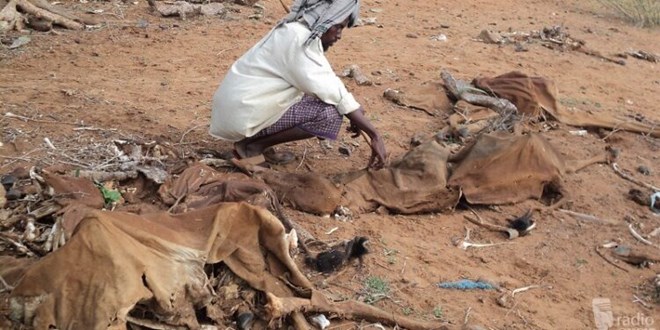
Tuesday March 28, 2023

(ERGO) – Muse Ali Said and his family had 70 goats at the beginning of this year in their village of Mir-awled in central Somalia, but the herd has now dwindled to just 20.
“The livestock start getting fever, they then start becoming dark, they also get mucus on their noses. They are sick for two days and quickly die,” use told Radio Ergo, explaining how disease has been wiping them out.
Muse said he tried to isolate the sick animals but the disease spread too fast. He lost 15 of his best goats that he was hoping to sell for a good price after feeding them up on food he had bought from stores in Gelinsor.
He now has debts of $500. For the past eight months, Muse and his family of six were taking food and fodder for the goats on credit. Shopkeepers will not allow them any further credit until they clear the debts.
They are depending on their neighbours for food and get one meal a day.
Their only camel also succumbed to disease on 30 January. Muse now has to walk one kilometre to the borehole to fetch water for his family.
Thousands of livestock have died since January in drought-hit villages across Galgadud, where veterinary experts say Peste des Petits Ruminants (PPR) and Contagious Caprine Pleuropneumonia (CCPP) are among the diseases that are spreading.
Ismail Gelle Hassan, another pastoralist in Mirawled, lost 30 goats since February. He has 50 goats left and is concerned that more could die.
He tried to treat his livestock for CCPP and PPR but their immunity was already weakened by the lack of fodder and water for many months.
Unable to sell the livestock, Ismail has racked up $3,500 in debts to feed his family over the past three years.
His sister in Mogadishu was sending him $70 every month until she fell sick and stopped. The money used to help him buy milk and food for his family.
Nineteen of his remaining 50 goats have been showing signs of disease but he has no money for treatment. Although worried about leaving his family behind, he has been thinking of going to Adado, 55 kilometres away, to look for work.
“If the livestock die, I will have to leave the children behind and get a job somewhere,” he said.
The head of training and planning at Galmudug state livestock ministry, Fahmo Abdi Hussein, said malnutrition left the animals vulnerable to disease, which become more prevalent in seasons of drought.
The ministry has registered the spread of diseases in 30 districts and is planning a treatment campaign.
“The livestock will be treated; a project was launched recently and we have already treated one million goats. CCPP disease can be treated but PPR is viral and can only be prevented by vaccination,” she explained.
She said the treatment campaign will reach all the districts where the livestock diseases are spreading. She advised the pastoralist communities to take care of their livestock and report to the ministry when they see livestock diseases.